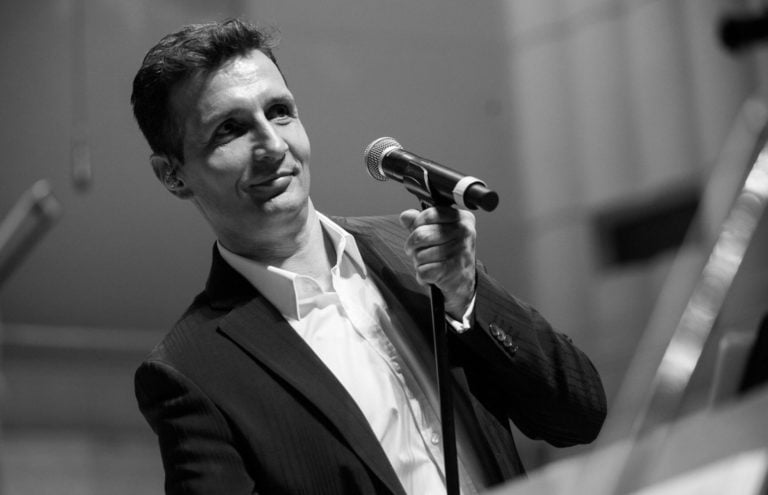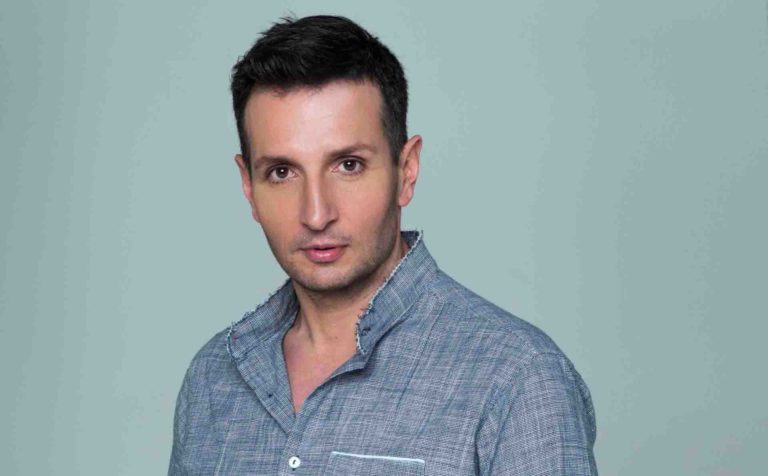Stuttgart-born Dimitris Basis is no stranger to the plight of diasporan Greeks. His own parents lived and worked in Germany during his most formative years, before they returned to their small village at Cherso, near Kilkis in Northern Greece, when he was aged eight. By nine, he was chanting the liturgy at his local church before deciding to study Byzantine music just three years later.
No stranger to Australia, he is back for the celebration of the Bicentennial of the Greek Revolution, for a series of concerts to honour Greek Independence which include uplifting songs by Mikis Theodorakis, Manos Hadjidakis, Vassilis Tsitsanis and Stavros Xarhakos.
We caught up with him while he was still in hotel quarantine, from where he spoke to Neos Kosmos about his six upcoming concerts in Australia, and shared his thoughts about the pandemic and Greek music as well as his views concerning Greek Australians.
How is your experience with quarantine?
What I am experiencing here, the mandatory quarantine, as a requirement for every visitor coming to Australia from abroad is a different kind of quarantine from the one we have been experiencing for a year now (with a few breaks in between) in Greece. This is completely different to being quarantined at home with your family, your children, your personal space, than to be locked up in a room. Apart from the feeling of confinement, which is the worst, quarantine also has its positives. For the 10 days that I have been here in Australia, I had a lot of time to talk to friends of mine (via videocall) who I had not spoken to in years. I listened to music, I had time to “reboot”. It’s all in your head. You can do things in quarantine to pass the time. I talked to my band here in Australia about the rehearsals that await us, about various music related issues that we had to work through – this is how I pass my time in quarantine here in Sydney.
What effects do you think the pandemic we are experiencing will have on our lives?
We’re moving into uncharted waters. The pandemic will surely [affect] the world’s economy. It will definitely bring about changes in the way people work. Teleworking and working from home I think, to a large extent, will remain, for some companies. I do not know what people’s behaviour will be like after all the quarantining that has taken place. I am worried about the effects of the pandemic on children, because I have two children, who have been staying at home for a year doing distance learning. Children are full of energy, they are cut off from their friends, they are cut off from their natural environment which is in person learning. I hope we will overcome this thing quickly. This is my concern and I believe that, little by little, if the financial crisis is overcome, we will return back to normal. I think it will take one more year.
How does the entertainment industry in Greece experience the current situation?
The world of entertainment and culture has been hit the hardest by this pandemic economically. It is very difficult, because artists make a living from this job. There is nothing on the horizon that indicates that the world of entertainment will open immediately and if it does, it will open with many restrictions. This saddens us.
An artist is creative when they are in a good mental space. The beginning of quarantine was creative for all of us. We sat in our homes, wrote songs, got inspired, made our plans without knowing how long this situation will last.
But now, where almost a year has passed, our industry has been hit hard. This branch numbers about 120,000 people (musicians, singers, technicians, actors, set designers, choreographers etc). The entertainment industry is very big and it needs support. Not just for the singers, but even more so for the people behind the scenes or behind an artist on stage, people who are hardly getting by during this time.
READ MORE: Greek Community of Melbourne will host Dimitris Basis in May

We are, once again, fortunate to have you here in Australia. What are your feelings, especially this time, where the Greeks are celebrating this important anniversary?
This is an important year for Greece and for Hellenism. We are celebrating the 200th anniversary of the founding of the modern Greek state after the revolution of 1821. The fact that the Greek community has chosen me to give concerts all over Australia dedicated to such a great event is a great honour for me. Sincerely, thank you. It is something we have been working on for a year. The concerts that we will present are concerts with a large symphonic orchestra, playing works by Hadjidakis – Theodorakis, Xarhakos – Tsitsanis, under the direction of George Ellis. It is impressive that songs by Tsitsanis will be performed by a symphonic orchestra, as well as by Xarhakos, Theodorakis and Hadjidakis. Although we have heard songs by Theodorakis, for example, being played by large orchestras, works by Tsitsanis are not usually played by large orchestras, but I think that shows the greatness of the music written by these great composers. These four composers were chosen because I consider them to be the pillars of Greek song. They are the composers who shaped the Greek music scene in modern Greece. I think it will be something very impressive, something that will be unforgettable for the people that will attend the concerts.
Do you think it is somewhat an oxymoron that, on the one hand, we celebrate the 200th anniversary of the revolution, that is, in essence, the conquest of our freedom, and on the other hand, at the moment, the Greeks in Greece are deprived of freedom?
In that sense, yes, it’s an oxymoron. We celebrate our freedom, the founding of the modern Greek state and on the other hand, we are deprived of freedom, in the way you put it. Of course, all this is a coincidence. Who would expect that we would celebrate 200 years of the revolution and this pandemic would also come our way at the same time? Quarantining during the pandemic is mandatory and must be done. The fact that we spent 400 years being enslaved was something completely different. I see the anniversary as a great celebration and even in pandemic conditions, we manage to celebrate this great event. I would like to congratulate the Greek communities of Australia. We were very proud as Greeks when we saw the Greek flag waving “digitally” over the Sydney Opera House. This shows that the Greeks of Australia do everything to make the voice of Greece heard in this far corner of the globe.
READ MORE: Dimitris Basis: ‘Concert with Newtown school is a career highlight’

As far as I know, you also grew up in an immigrant household. How easy or difficult was it for you to make your dreams come true and get to the point of performing works by such great composers?
It is difficult to make your dreams come true, but when you want something very much and when you work systematically, I think in the end you will succeed. I, as a child of immigrants, born in Germany to Greek immigrant parents, grew up listening to Greek music a lot because my immigrant parents listened to the songs by Kazantzidis, Bithikotsis, and all other “laika” songs of their time. So I grew up in an environment listening to a lot of “laiko” and I fell in love with music and singing. In my teenage years, when I began to discover music, composers and singers, the desire to become involved in music and singing began to awaken in me. I decided very early on (at the age of 18) that what I want to do is become a singer. I never thought that the time would come when I would meet Mikis Theodorakis and make two records with him, I never believed that Nikolopoulos would write my first hits, just as I never thought I would be on stage with George Dalaras, Haris Alexiou, Dimitris Mitropanos, Alkistis Protopsalti, Glykeria, Eleni Vitali. I have collaborated with almost all the greats in the field. If someone asked me at 18 if I would think that this would happen, I would say no. But I had a very big desire in me to do what I love, which is music and singing.
A collaboration that was much loved by people was the one you did with Yiannis Kotsiras and Dimitris Mitropanos. Which of your collaborations has been unforgettable for you?
That collaboration is one of the most important ones I have undertaken, and it was the last one with Mitropanos, before he passed away. All collaborations are important. When, back in ’98, I collaborated with Haris Alexiou, when the show would come to an end every night, I couldn’t believe I was sharing the stage with her, because she is a singer that I studied a lot from a young age and I admired her and we ended up being on stage together. The collaboration I had made with Mitropanos and Adamantidis dedicated to zeibekiko was also a year when all our shows were sold out. I have experienced some very important moments in my career.
What do you think is the future of Greek music? Do you think there will ever be worthy successors of great creators, such as Theodorakis, Xarhakos etc?
I do not know if creators similar to Theodorakis, Hadjidakis, Xarhakos or Tsitsanis will ever come along. But I know that these people have laid the foundations to provide inspiration for those who follow. Time will tell whether there will be a next Hadjidakis or Theodorakis. You never know. But I believe that there is continuity. There are good singers that come out and new songs that are being written and there are, of course, our roots that are made up of all those great composers and traditional music. This is what makes Greek song immortal. It allows it to live on and adapt to new things, the way the younger generation wants it, because “laiko” was written differently in the 50’s and is written very differently now.
Do you have a message for the Greeks of Australia?
I am fortunate to have travelled the world doing this job. From New Zealand to Brazil and Argentina, I have always been singing to Greek audiences, because Greece is actually way bigger than it appears. Where there is Hellenism, there is Greece. I am moved the most whenever I sing to Greek Australian audiences. Here, Hellenism will surely endure for the next 200 years. Greek communities are very strong. I had visited schools in Melbourne and I was really moved. I felt that I was in Greece and I always carry that feeling with me when I go back. When people ask me how it was in Australia, I prefer to talk about my off-stage experiences. The love I receive from the Greeks moves me very much. My message to the Greeks of Australia is to keep their passion for Greece. Greece’s heart will beat in Australia for many more decades to come. Nowhere else in the world is the Greek element so strong, not in terms of population, but in relation to the passion that Greeks have for their homeland.